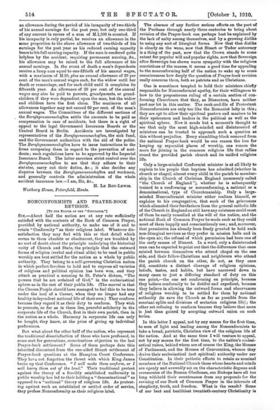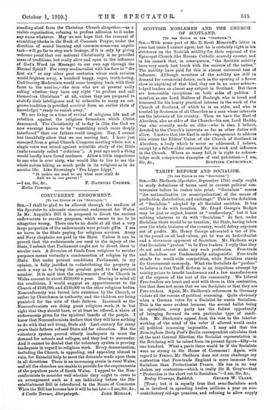NONCONFORMISTS AND PRAYER-BOOK REVISION.
[To TIM EDITOR Op IRE ..sreceeroa..i SIR,—About half the nation are at any rate sufficiently satisfied with the contents of the Book of Common Prayer, provided by national authority, to make use of it and to retain " Conformity " as their religious label. Whatever dis- satisfaction they may feel with this or that detail which seems to them obsolete or obsolescent, they are troubled by no sort of doubt about the principle underlying the historical unity of Church and State, the principle that the outward forms of religion (verbal and ritual alike) to be used in public worship are best settled for the nation as a whole by public authority. They belong to a self-governing Christian nation in which perfect freedom to hold and to express all varieties of religions and political opinion has been won, and they attach as practical a meaning to St. Peter's dictum, " The powers that be are ordained of God," in the ecclesiastical sphere as in the rest of their public life. (The marvel is that the Chosen People should have managed to feel this to be true under the heel of a Caesar, when they no longer had any healthy independent national life of their own.) They conform because they regard it as their duty to conform. They wish to promote, so far as in them lies, peaceful solidarity in the corporate life of the Church, first in their own parish, then in the nation as a whole. Harmony in corporate life can only be bought, they know, at the price of giving up individual preferences.
But what about the other half of the nation, who represent the traditional dissatisfaction of those who have professed, in some sort for generations, conscientious objection to the last Prayer-book settlement ? Some of them perhaps date this inherited discontent from the one-sided Stuart settlement of Prayer-book questions at the Hampton Court Conference. They have not forgotten the threat with which King James broke np that Conference. " I will make them conform, or I will harry them out of the land." Their traditional protest against the theory of a forcibly established uniformity in public worship has led to their holding a " denominational " as opposed to a "national" theory of religious life. As protest- ing against such an established or settled order of service, they profess Nonconformity as their religious label.
The absence of any further serious efforts on the part of the Puritans through nearly three centuries to bring about revision of the Prayer-book can perhaps best be explained by the lack of unity among themselves, and by a growing dislike to using any sort of liturgical forms. Now that that dislike is clearly on the wane, now that Stuart or Tudor autocracy is a thing of the past, now that the Crown stands to some extent for popular will and popular rights, now that Sovereign after Sovereign has shown warm sympathy with the religions convictions of the masses, it seems a good time for appealing to the nonconforming half of the nation to wake up to some consciousness how deeply the question of Prayer-book revision really concerns them, both as patriots and as Christians.
One is sometimes tempted to hold their ministers chiefly responsible for Nonconformist apathy, for their willingness to bow to the preposterous ruling of a certain section of con- forming Churchmen that they, as Dissenters, have neither part nor lot in this matter. The rank-and-file of Protestant Nonconformists are only too like the Romanist laity in this ; they are apt to allow their spiritual pastors and masters to be their spokesmen and leaders in the political as well as the spiritual sphere. Now it needs but a moment's thought to see that only the most high-minded and disinterested of ministers can be trusted to approach such a question as this without prejudice. Every stumbling-block removed from the national Prayer-book would be one reason the less for keeping up separatist places of worship, one reason the more for joining in the common religious life that rallies
life. round the provided parish church and its unified religious
f Only a large-minded Conformist minister is at all likely to explain to his people that baptism has admitted (whether in church or chapel) almost every child in the parish to member- ship in the Church of Christian England (commonly called "the Church of England "), whether he is subsequently trained to a conforming or nonconforming, a national or a denominational, type of Churchmanship. Only a large- minded Nonconformist minister either realises himself, or explains to his congregation, that such of the grievances which alienated their forefathers from the general catholic life of the Church in England as still have any existence could most of them be easily remedied at the will of the nation, and the national Book of Common Prayer be made such as they could most of them happily and conscientiously use ; and, moreover, that permission has already been freely granted to hold such non-liturgical services as they prefer in mission halls and in the open air, the refusal of which permission had been one of the early causes of Dissent. In a. word, only a disinterested man can be expected to point out that the differences that once existed between themselves who attend chapel on the one side, and their fellow-Christians and neighbours who attend the parish church on the other, do not, as they once did, constitute a distinct cleavage of religious opinions, beliefs, tastes, and habits, but have narrowed down in many cases to just a differing standard of duty on this one point,—the one set conforming on principle, because they believe conformity to be dutiful and expedient, because they believe in allowing the outward forms and observances of religious worship to be settled for them by national authority (to save the Church as far as possible from the constant splits and divisions of sectarian religious life) ; the other set refusing to conform because they believe that more is lost than gained by accepting outward union on such terms.
In this letter I appeal, not by any means for the first time, to men of light and leading among the Nonconformists to take a broad, patriotic, Christian view of the religious life of the nation. And at the same time I will venture to appeal, not by any means for the first time, to the nation's ecclesi- astical rulers, behind whom are of course the King, the Houses of Parliament, and the Houses of Convocation, whence they derive their ecclesiastical (not spiritual) authority under our Constitution. In their pathetic efforts to retain as nominal members of the National Church those whose hearts and minds are openly and avowedly set on the characteristic dogmas and ceremonies of the Roman Obedience, our Bishops have all too long withheld their countenance from any proposals for the revising of our Book of Common Prayer in the interests of simplicity, truth, and freedom. What is the result? Some of our best, and healthiest twentieth-century Christianity is
standing aloof from the Christian Church altogether,—as a visible organisation, refusing to profess adhesion to it under any name whatever. May we not hope that the removal of stumbling-blocks in the Book of Common Prayer, under the direction of sound learning and common-sense—an angelic task—will go far to stop such leakage, if it is only by giving welcome proof that our national Christianity is no petrified mass of traditions, but really alive and open to the influence of God's Word (or Message) to our own age through the Eternal Spirit P For every mediaevalist with his face to " the first six" or any other past centuries whom such revision would frighten away, a hundred happy, eager, truth-loving, God-fearing Modernists would come trooping back with their faces to the sunrise,—the men who are at present sadly asking whether they have any right " to profess and call themselves Christians" at all, unless they are prepared to , stultify their intelligence and to subscribe to many an out- grown tradition (a petrified survival from an earlier state of knowledge) " ready to vanish away."
We are living in a time of revival of religious life and of rebellion against the religious formalism which Christ denounced. The Christianity of to-day is (like the God we now worship) known to be " something much more deeply interfused" than our fathers could imagine. Nay, I cannot but thankfully allow that we are moving fast. I have just emerged from a great Church Congress meeting where not a single voice was raised against scientific study of the Bible (unfot tunately called "criticism"). A year ago such a thing would hardly have found credence. Allow a little impatience to one who is over sixty, who would like to live to see the whole nation taking as much pride in its religious as in its secular life. Like Browning's "Fra Lippo Lippi,"
" It makes me mad to see what mon shall do And we in our graves !"



























































 Previous page
Previous page